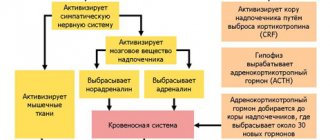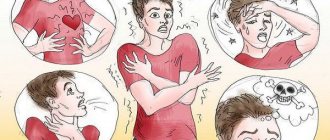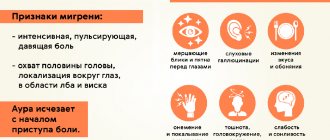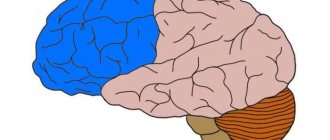Researchers from the University of Bristol studied the reaction of rats to tickling. They found a way to accurately measure the emotions of rodents and noticed that some of them squeaked during this procedure. Tests have shown that the pitch of the squeak is directly proportional to the level of pleasure the rat experiences when tickled. This once again proves that tickling is an ancient mechanism inherited by humans from distant ancestors.
Our body constantly “talks” to us in the language of signals. We'll tell you why evolution came up with some physiological mechanisms and what meaning it put into them.
Tickling
There are different versions of why nature has endowed us with the ability to laugh when tickled, as well as to be afraid of it. One hypothesis is that it signaled to our ancestors about insects crawling on the skin that could be parasites. Hence the fear of tickling, familiar to many of us.
But then it is not clear why tickling causes laughter. Is this a normal reaction to insects crawling on your body? Therefore, other scientists adhere to a different version: tickling is needed to establish contact between the cub and its mother. With its help, without having absolutely anything at hand (or paw), they can play, have fun and get positive emotions. This version is also supported by the fact that with age we stop responding to tickling with laughter. On the contrary, many people find it unpleasant.
It's ticklish! What makes you laugh? More details
There is an opinion that in previous centuries tickling was used as torture and could bring a person to death. “Most likely, these are fictions and horror stories,” says physiologist, candidate of medical sciences Nikolai Zakharov .
“You can’t tickle a person to death.” The body adapts to the tickling: you either stop feeling it or temporarily lose consciousness.”
How does this happen
Yes, just like almost any other reflex! The nerve endings are stimulated and send an impulse to the brain, which makes us laugh. However, not everything is so simple, because this process simultaneously involves the part of the brain that determines whether this sensation is pleasant for the brain or not, and the area in the hypothalamus, where the automatic reaction to the threat comes from. It turns out in two ways, but at least it’s clear why we are afraid of tickling on a reflex level. But what causes the brain to react this way?
Goosebumps
They cover us from the cold. But it happens that their appearance is caused by some event colored by strong emotions - someone’s action, a movie seen, music listened to...
This mechanism, which in the language of science is called piloerection, and in common parlance - “goose bumps”, also came to us from primitive people, and to them from their mammalian ancestors. Goose bumps on the surface of the body are caused by the contraction of tiny muscles in the skin. They raise the hair when freezing so that the heated air lingers longer near the body and does not fly away into the surrounding space.
"Goose pimples". Why do goosebumps appear and run all over your body? Read more
The same reflex is triggered in a situation of danger: raised hair makes the animal (look at a cat when it meets a dog) more massive, giving it a frightening appearance. With strong emotional reactions - rage, fear, delight - our nervous system is excited, and this can lead to goosebumps. If we had wool, it would stand on end at that moment.
Piloerection has lost its practical meaning for humans, turning into a rudiment, like some organs of our body - the coccyx, the appendix. After all, Homo sapiens long ago lost their thick coat of fur, and invented clothing to protect them from the cold.
Vestiphobia is the fear of getting dressed.
0 Vestiphobia is the fear of dressing. Yes, yes, such a phobia exists. And there is no need to confuse people who are simply afraid to dress and those who do not do this on purpose - nudists. A person who suffers from vestiphobia usually wears loose, loose clothing that does not meet any standards. Or, in general, he tries to get away from society so as not to be dressed, then this can develop into social phobia, which is much more unpleasant. What could be the causes of vestiphobia? Usually they lie in the childhood of the sufferer. Perhaps the demands on his clothing were too high, which developed into a desire to avoid all prohibitions. Maybe you constantly had to wear clothes that were too small and tight, which caused pain and discomfort, which later also became one of the reasons for dislike and fear. In the end, regular over-tightening of laces, ties, straps and all that stuff. There can be many options. It is necessary to strive to get rid of this phobia, as it causes the patient a lot of trouble. With quality therapy, this problem is completely solvable.
Shiver
This mechanism is similar to the one that causes goosebumps. When a person is cold or scared, he begins to tremble. Why?
Warm-blooded animals, and we are one of them, have a very important physiological ability - to maintain body temperature at a constant level. Trembling your muscles is one way to avoid heat loss and a drop in temperature when it suddenly gets cold. Skeletal muscles begin to make small and frequent contractions, which release heat that spreads throughout the body.
“The brain runs on one battery.” What our scientists found in the human head Read more
“When a person is scared, he also begins to tremble. This way we strengthen the functioning of the nervous system, including the autonomic one. All organs and internal systems are tuned to actions related to salvation - either an attack on the enemy, or a swift escape,” explains the scientific secretary of the Institute of Physiology. I. P. Pavlova RAS, candidate of biological sciences Alexander Chuikin .
It is noteworthy that muscle contractions are sometimes used by cold-blooded animals: insects, fish, and reptiles. For example, bees and bumblebees warm their hives and nests due to the intensive work of their wings. They do this to prevent the developing larvae from getting cold.
Coulrophobia is the fear of clowns.
0 This phobia is an abnormal or exaggerated fear of clowns. It is often found among children, but there are also cases of this type of phobia in adolescents and adults. This fear is acquired, as a rule, after some unsuccessful communication with clowns, or after a person encounters an ominous image of a clown in the media. The strange appearance of the clown, swollen red noses and unnatural hair color makes these faces so mysterious and insidious. Adults who are victims of this type of phobia know that their fears are completely irrational and illogical, but they cannot cope with the emotions that overcome them.
Cry
The practical benefits of tears are well known to physiologists and ophthalmologists. They moisten the cornea of our eye and thereby protect it from foreign objects (for example, from an eyelash falling into the eye), as well as from drying out, infections, and caustic volatile substances. And thus improve the quality of vision. For example, if a speck or eyelash gets into the eye, the tears will wash it away.
Cry, girl! What are the benefits of tear therapy? More details
All land animals have lacrimal glands, which constantly produce a fluid of complex composition. By the way, the chemical compositions of blood and tear fluid are close. Roughly speaking, it is a derivative of blood and also contains several types of salts. And the most useful substance found in our tears is lysozyme. It can kill many microbes and provide disinfection of the eye membranes.
However, why do people cry when they have a strong emotional reaction - grief, fear, compassion, as well as great joy? Scientists are still arguing about the reasons. There are two versions here, and perhaps both are correct. Firstly, crying gives a signal to other people that you feel bad and need help or sympathy. Because Homo sapiens are more socially connected than anyone else in the animal kingdom, empathy and compassion are very important from an evolutionary perspective. Neuroscientists conducted an experiment: they asked photographs to determine the degree of sadness of crying people, while in some photographs the tears were removed using Photoshop. People who had tears removed from their faces seemed less sad to the subjects.
The second hypothesis: tears help the crying person cope with emotional stress and alleviate grief. After all, stress hormones leave the body along with them. Therefore, after crying, we feel relieved.
“Male and female are different.” Neuroscientist on the secrets of the human brain Read more
Aurophobia - fear of gold.
0 See all photos in the gallery
In ancient times, there was a type of execution - they poured molten gold into the throat. Survivors of this procedure almost certainly developed aurophobia. However, jokes aside, such a phobia really exists. There are a lot of different stories and legends associated with gold, some much more severe than those told in the first paragraph. In any case, a similar story heard in childhood can make a strong impression. As a result, in the future, an adult may begin to panic at the sight of gold items, and from touching gold, symptoms similar to allergic ones may develop. This phobia is highly treatable and treatment does not take much time. Therefore, turning to a psychologist is highly recommended; of course, you can live without gold, but it’s better not to be afraid of it.
Hiccups
Our main breathing muscle is called the diaphragm. Hiccups arise from the fact that spasms appear in it and, with sudden contractions, strong convulsive breaths occur. This is the mechanism, but the cause of hiccups is not completely clear.
“One version is a pinched vagus nerve. It passes from the chest to the abdominal cavity, closely adjacent to the esophagus. When we eat hastily, quickly filling the stomach, the vagus nerve is pressed and irritated, says physiologist, candidate of medical sciences Nina Alekseeva. - The same effect is possible if we take a sharp breath from cold or fear. The body reacts quickly to compression of the nerve: it gives a signal to the central nervous system, and it begins to contract the diaphragm in order to free the vagus nerve, on which the functioning of many of our organs depends. That is, hiccups are such a defense mechanism.”
Hiccups may be a legacy of the very ancient ancestors of humanity, who breathed through gills, some scientists believe. They suggest that there are connections left in the ancient cortex of our brain that are responsible for pushing water out of the gills. An analogy has been noted between hiccups and ventilation in tadpoles.
Method one – complete “switching”
The first thing a person who is being “tickled” needs to relax as much as possible. It is recommended to do breathing exercises - take a smooth deep breath and exhale the same way. During it, you need to try to switch from this situation to any other: think about existing problems, reflect on philosophical topics, mentally imagine any phenomenon, for example, the sun rising, waves splashing or water flowing from a tap. This cunning method will allow a person to concentrate on his thoughts, this will reduce the sensitivity of nerve endings.
Sources
- https://pochemu-otchego.info/pochemu/pochemu-lyudi/pochemu-lyudi-boyatsya-shhekotki/
- https://psyhoday.ru/strahi-fobii/boyazn-shchekotki.html
- https://topor.info/why/boyazn-shhekotki
- https://fb.ru/article/331494/kak-perestat-boyatsya-schekotki-neskolko-effektivnyih-uprajneniy
- https://urazuma.ru/strahi-fobii/boyazn-shchekotki.html
- https://neurofob.com/mental-behavioural/phobias/kak-perestat-boyatsya-shhekotki.html
The smell of sweat
Each of us has encountered a situation when there is a person nearby whose smell of sweat literally makes us sick. Holding our nose, we think: “How can his loved ones tolerate him? Although what kind of loved ones... Who would live with such a stinker? However, it soon turns out that the person has a spouse, and he (she) does not find this smell unpleasant. How so?
The smell of illness. What does the body smell like with this or that pathology? More details
“A lot of glands that secrete sweat are located in the armpit area. The hair growing there enhances the smell of sweat and concentrates it. This smell has an important biological function. Our ancestors used it to find marriage partners. Nature intended it this way: the more different the genotypes of the parents are, the better for their offspring - they will have a more diverse set of genes, explains Nikolai Zakharov. — Scientists have proven that if a person finds someone else’s smell pleasant, it means that its carrier is suitable for him as a sexual partner according to his genotype. But the repulsive smell says otherwise.”
True, there is an opinion that it is not sweat that a person smells, but the microbes that live in abundance on his body. And sweat, which is almost 100% water, only creates good conditions for their reproduction.
Reasons and features of existence
It is formed due to the existence of conditions under which it may be profitable to hide one’s economic activities from a wide range of people. The scale of concealment can be different - from concealing the very existence of a company or the existence of certain assets, to concealing individual transactions.
All other things being equal, the higher the tax burden, the larger the shadow sector of the economy, since enterprises located in it, due to non-payment of taxes, gain a competitive advantage over other firms and force them out of the market. The more complex the bureaucratic procedures in developing countries, the larger the sector of the economy. The economics of crime and punishment, in particular, deals with questions of the appropriateness of such behavior.
Enterprises in the shadow economy usually do not comply with the standards (for example, GOST) that surround any type of licensed activity. Sometimes the shadow sector develops due to increased administrative barriers to entry into the market.
On average, the more employees there are in a company, the less likely it is that they receive an undocumented salary “in an envelope”, on which taxes are not paid.
The more involved an enterprise is in shadow activities, such as cashing out, the shorter the period of its probable existence, since the liquidation of such companies is another way to hide traces of its activities.
The autonomous non-profit organization “National Institute for Systemic Research of Entrepreneurship Problems” (NISIPP) put forward a version of the main reasons for “going into the shadows” in 2007:
The more inevitable and serious the punishment for conducting shadow economic activity, the less, other things being equal, its volume. At the same time, an increase in the inevitability of punishment reduces the volume of the shadow economy more than an increase in the severity of punishment, especially when the probability of incurring it is low.
Why does it tickle in the anus?
Light tickling sensations in the anal area often begin completely asymptomatically. The patient assumes that the culprit is bitter food products or a nervous situation, or irritation to cosmetic care products. But the discomfort does not go away even after changes in daily hygiene, only increasing with physical activity and stress. To avoid serious complications, it is better to consult a proctologist.
In the vast majority of cases, tickling in the anus is one of the first symptoms of changes in the venous system that supplies the lower intestine. Patients describe it as a subtle tingling or itching inside the rectal passage. It most often occurs in people who spend a long time in a monotonous “sitting” position: drivers and office workers, clerks and cashiers. Pathological vascular disorders are also observed in men who actively work with weights: loaders and weightlifters.
The feeling of tickling in the anal passage is due to improper redistribution of blood and lymph fluid in the pelvis. After sitting for a long time, they slow down their natural movement through the vessels and accumulate in one area. The veins gradually stretch and form painful plexuses at the site of injury - hemorrhoids. When a person suddenly stands up or strains the muscles in the pelvis, a sharp outflow occurs and a feeling of discomfort and a slight irritating itching appears.











